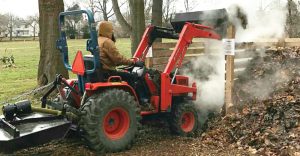BioCycle February 2017
 Cleveland Ohio: Rust Belt Riders Expands Operations
Cleveland Ohio: Rust Belt Riders Expands Operations
BioCycle checked in recently with Michael Robinson of Rust Belt Riders (RBR), a Cleveland-based commercial organics collection service that started in June 2014 using bikes with custom-made trailers (see “Organically Growing Organics Collection,” May 2016). Originally, RBR took collected organics to 12 community gardens around Cleveland for composting. Its expansion over the past several years has included the addition of vehicles, including a box truck, for collection. Robinson reports the following new developments:
“We are currently collecting from 50 organizations, which is only 5 more since BioCycle wrote the article, but these new locations have significantly higher volumes than previous accounts. We are phasing in an area health care system as well as a grocery store chain. …. Rust Belt Riders still works with a network of community gardens and urban farms for community-scale composting. We also bring some materials to Kurtz Brothers, one of the only Class 2 licensed facilities in Northeast Ohio. It is through this network that we are able to compost roughly 10,000 lbs/week of food scraps.
“Two of the community sites are especially notable. Ben Franklin Community Gardens in Cleveland’s Old Brooklyn Neighborhood has been active for over 30 years. At 5 acres, it is one of the largest in the country with 207 plots and 180 gardeners per year. Ohio City Farm was at one point one of the country’s largest contiguous urban farms at 6 acres. It is run in part by Refugee Response, an organization whose mission is to ‘empower refugees to become self-sufficient and contributing members to the their communities.’ We will be prioritizing community composting (processing the material at community gardens close to where the material is generated) as we expand our processing capacity to accommodate increasing feedstocks.
“In March, we will be rolling out three months of educational programming using a shipping container, called the ICAN2LAB, that has been converted into a mobile classroom in partnership with Cleveland Neighborhood Progress’ Climate Ambassadors to advance neighborhood scale climate adaptation strategies. The container will travel to four of Cleveland’s neighborhoods to work directly with communities to provide education and workshops on climate change, food waste, composting, and more.
“In conjunction with our ongoing community composting and education, we are diversifying our impact on the local food ecosystem by producing protein for animal feed in the form of black soldier fly larvae. We will be moving into a 10,000 square foot facility which we anticipate will have the ability to process as much as 10 million pounds of food waste and generate 80 tons of animal feed annually once fully functioning.”
Milwaukee, Wisconsin: City Rolls Out Pilot Organics Collection
Milwaukee is exploring curbside organics collection, initiating a one-year pilot program for about 500 households. The service will cost $12.75/month; it includes a $1.00/household/month credit for organics not landfilled. Participants will receive a 64-gallon cart from the Department of Public Works (DPW) at no cost. Collection service — weekly from April to November and biweekly from December to March — will be provided by Compost Crusader, with processing by Blue Ribbon Organics. Each participant also will receive a Welcome Starter Kit that includes a welcome letter, a kitchen caddy, compostable BioBags, a full list of compostable items to include in the organics cart, and a collection schedule. Meats are not accepted, and all organics must be in paper or compostable plastic bags inside the carts.
The pilot is a result of Milwaukee Mayor Tom Barrett adopting a goal to increase the annual landfill diversion by 40 percent by 2020, and a 2015 legislative resolution that directed the DPW to study the feasibility of an optional organics collection program by operating a one-year pilot, with additional costs passed on to participants. DPW selected the contractor through a competitive RFP process.
Atlanta, Georgia: Airport Planning New Composting Operations
Six firms are competing for a chance to develop and operate a composting and recycling facility at Atlanta’s Hartsfield-Jackson International Airport in the latest round of contracting for the project known as Green Acres. The firms include Cash Development LLC, Randolph & Company LLC, Columbia Technology LLC, Green Energy & Development Inc., Multiplex LLC and Sun State Organics LLC, according to the city of Atlanta’s procurement department. The airport is seeking a vendor to lease up to 30 acres of land to design, construct, finance, operate and maintain facilities to recycle and to compost airport organics and yard trimmings from the city. This is Hartsfield-Jackson’s fourth attempt to find a company to build and operate the Green Acres facility on a long-term lease.
The airport has struggled in recent years to improve its environmental sustainability. In 2009, it launched the GreenSortATL (Atlanta) program to improve recycling, but that failed due to excessive contamination in the recyclables. In 2012, plans to divert food scraps to the former Greenco Environmental facility in Barnesville ended when that facility closed. Hartsfield-Jackson then decided to develop a facility itself, creating Green Acres ATL Energy Park Campus, which is envisioned to include both composting and anaerobic digestion, a recyclables material recovery facility, greenhouses, a combined heat-and-power station, solar arrays and an education center.










